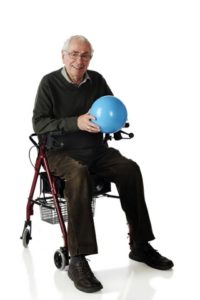
The body’s nervous system is not immune to damage and dysfunction. Like muscles, bones, joints and ligaments; our nerve pathways can also experience trauma and irregularities. In many neurological conditions, the problem is caused by abnormalities in the brain, spinal cord or other nerves in the body. There is a range of symptoms that effect people who suffer from neurological conditions including muscle weakness and paralysis, poor coordination, loss of sensation, seizures, confusion and pain. Let us tell you about some of the neurological conditions that we treat:
Stroke
A stroke can happen in two main ways:
- Blocked Artery: A blood clot or plaque blocks a blood vessel in the brain (ischaemic stroke).
- Bleed in the brain: A blood vessel in the brain breaks or ruptures (haemorrhagic stroke).
The brain is divided into several areas that control different functions. These include how you move your body, receive sensory messages (such as touch, sight or smell), use language and think.
Every stroke is different and each person suffering a stroke will have different problems and different needs. The way in which you might be affected depends on where in the brain the stroke happens and how big the stroke is. A stroke on the right side of the brain generally causes problems on the left side of the body. A stroke on the left side of the brain causes problems on the right side of the body. Some strokes happen at the base of the brain and can cause problems with eating, breathing, movement, balance and co-ordination.
Parkinson’s Disease
Parkinson’s disease affects the control of body movements. It is predominantly diagnosed in the middle to later years (50-75 years), however up to 20% who are diagnosed, are between the ages of 30 and 50 years. Symptoms of Parkinson’s Disease vary between individuals.
Three main symptoms include:
- Tremor: This usually begins in one hand and then spreads to the leg, before crossing to the other side. Typically it is most noticeable at rest and when stressed or tired, and disappears during movement and when asleep.
- Rigidity or stiffness: The muscles seem unable to relax and are tight, even at rest. You might feel that your muscles will not do what you want them to do.
- Bradykinesia (slowness of movement): The brain is not able to control smooth and delicate movements. Fine motor coordination is reduced with handwriting often smaller. Many experience “freezing” or periods of immobility.
Multiple Sclerosis
 Multiple sclerosis (MS) is a chronic disease that affects the central nervous system. The central nervous system is part of the body’s communication system. It is made up of the brain, spinal cord and the optic nerve. Scars appear in the central nervous system as inflammation created by the body’s immune system cells breakdown myelin, the insulating material that covers the nerve fibres. This can result in impairment of motor, sensory and cognitive functions to varying levels of extent.
Multiple sclerosis (MS) is a chronic disease that affects the central nervous system. The central nervous system is part of the body’s communication system. It is made up of the brain, spinal cord and the optic nerve. Scars appear in the central nervous system as inflammation created by the body’s immune system cells breakdown myelin, the insulating material that covers the nerve fibres. This can result in impairment of motor, sensory and cognitive functions to varying levels of extent.
The cause and cure of MS is still very much unknown. It is estimated that 23 000 Australians have MS. The frequency and severity of attacks cannot be predicted. Every case of MS is different to another. Some people may have one or two episodes and then remain symptom-free for the rest of their lives. In others with MS, it can progress steadily over many years, which results in a slow deterioration of an individuals functional capabilities.
Symptoms of MS can be any combination of the following:
- Motor control – muscular spasms and problems with weakness, coordination and balance
- Fatigue
- Other neurological symptoms – including vertigo, pins and needles, neuralgia and visual disturbances
- Continence problems – including bladder incontinence and constipation
- Neuropsychological symptoms – including memory loss, depression and cognitive (thought-related) difficulties.
Other Neurological conditions include:
Motor Neuron Disease
Guillain Barre Syndrome
Peripheral Neuropathy
Brain Aneurysm
Brain Tumors
Spinal Cord Tumors
To find out more information, or to book a time to get started on the management of your neurological condition, call us now for an expert plan, treatment, and support system. At My Mobile Physio, we are committed to delivering the best and most tailored designed physiotherapy solution to ensure the highest quality of life possible.




 CALL US:
CALL US: